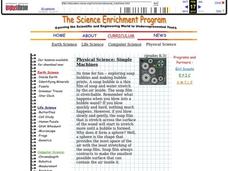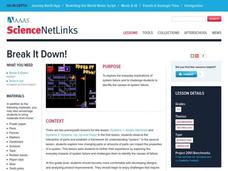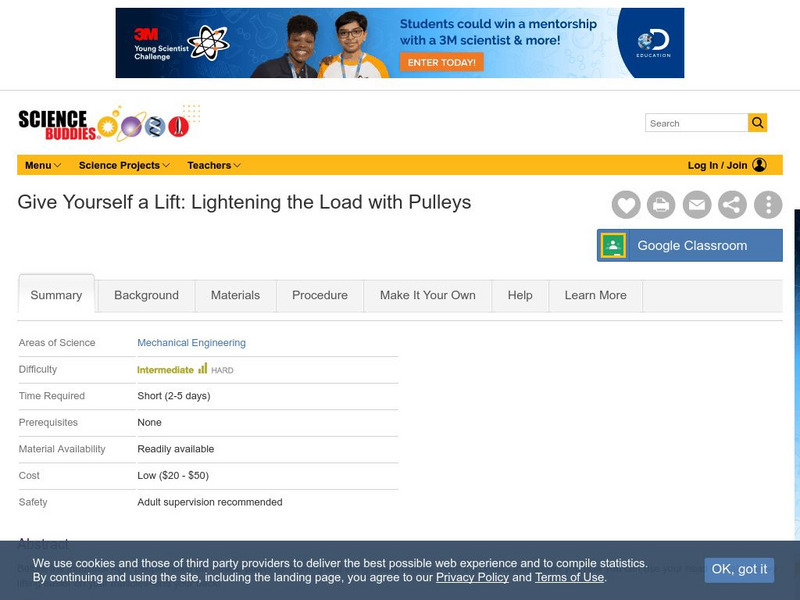Curated OER
Forces That Move Objects
In this forces worksheet, students complete a graphic organizer by writing in examples of simple machines that can apply forces to move objects.
Curated OER
What Are Simple Machines?
In this simple machines worksheet, students categorizes examples of simple machines as either changing strength, changing direction, or both. This worksheet is a graphic organizer.
Curated OER
Forces and Machines
In this forces and machines worksheet, students will review vocabulary associated with forces including friction, inertia, and work. Students will also explain how simple machines help to do work easier. This worksheet has 10 matching, 6...
Curated OER
Simple Machines
In this simple machine worksheet, students read twelve clues to complete a crossword puzzle. The clues are a review of all simple machines.
Curated OER
Simply Machines
In this machines worksheet, students draw a "Rube Goldberg" style machine which uses 3 different types of simple machines to complete one task.
Curated OER
Pull(ey)ing The Science Out (Or Pulleys)
Young scholars investigate how the number of pulleys affect the difficulty or ease of pulling an object up. They watch a demonstration that shows the work done by one pulley and two pulleys. After watching the demonstration, the students...
Curated OER
Simple Machines
Students discover what simple machines are and identify a gear, a pulley, and a lever. In teams, they build at least two models each of simple machines and challenge them with specific instruction cards. Finally, students present and...
Curated OER
Simple Machines III - Pulleys
Fourth graders are introduced to a spring scale to show that the forces on both sides of the pulley are the same. They break into groups to lift objects with fixed pulleys and with multiple looped pulleys and then measure the force...
Curated OER
Machines: Not So Simple
Students examine the names and images of simple machines in a matching activity. They build a simple machine using K'NEX before taking and printing out a digital picture of their example. They complete five station activities based on...
Curated OER
Smoses Toy Expo
Students research one of the simple machines listed in the lesson and review several simple machine websites to complete their research. Students use software and a watch a video to learn more about machines. Students create a poster...
Curated OER
Levers and Pulleys and Gears, Oh My!
Students explore the difference between compound and simple machines in this six lessons of this unit. The purpose and importance of a variety of types of simple machines and the effects of friction are investigated.
Curated OER
Pulley Power
Third graders engage in a manipulative experiment in the mechanical advantage of simple machines. It graphically demonstrates the change in magnitude of applied force when using simple machines. Great for ESL to discover the ratio...
Curated OER
Break It Down!
Students explore the everyday implications of system failure. They are challenged to identify the causes of system failure.
Curated OER
Simple Machines
In this simple machines worksheet, students review the different types of simple machines and examples of each machine. This worksheet, has 1 graphic organizer and 6 short answer questions.
Curated OER
How Do Simple Machines Work?
In this simple machines worksheet, students brainstorm problems that can be solved by the work of simple machines. This worksheet is a graphic organizer.
Curated OER
Simple Machines
In this simple machines worksheet, students will write in 6 examples of simple machines and then write in what those simple machines can do.
Curated OER
How Do We Use Simple Machines?
In this simple machines worksheet, students will come up with five problems that we use simple machines for to help us solve that particular problem.
Curated OER
Secrets of Lost Empires I-Colosseum
Sixth graders identify how to use pulleys to change the direction of force. Students develop ways to evaluate designs, noting that no one best design exists and that different tasks require different designs. Students designs will vary.
Curated OER
Building A Sturdy Car
Students build a sturdy Lego car using a motor and a pulley. They determine how sturdy the car is by dropping it from the height of the teacher's knee.
CK-12 Foundation
Ck 12 Exploration Series: Simulations: Physics: Block and Tackle
[Free Registration/Login Required] A video module where students learn about the relationship between force, work, energy, and mechanical advantage using a simple machine.
Science Buddies
Science Buddies: Give Yourself a Lift: Lightening the Load With Pulleys
Before the Industrial Age, people relied on muscle power for moving and lifting heavy objects. Here's a project that shows you how you can use your head to make heavy lifting easier on your muscles - and your back.
Technology Student
Technology Student: Gears and Pulleys
This site describes the basics of gears and pulleys, and their use in simple machines.
TeachEngineering
Teach Engineering: Machines and Tools, Part Ii
In this activity, students gain first-hand experience with the mechanical advantage of pulleys. Students are given the challenge of helping save a whale by moving it from an aquarium back to its natural habitat into the ocean. They set...
TeachEngineering
Teach Engineering: Pulley'ing Your Own Weight
Using common materials (spools, string, soap), students learn how a pulley can be used to easily change the direction of a force, making the moving of large objects easier. They see the difference between fixed and movable pulleys, and...
























